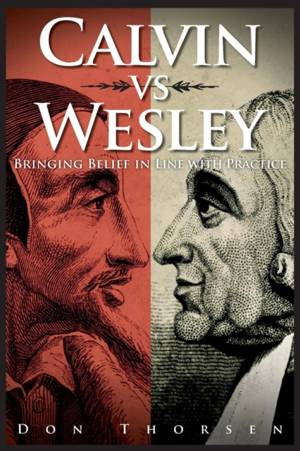
- Afhalen na 1 uur in een winkel met voorraad
- Gratis thuislevering in België vanaf € 30
- Ruim aanbod met 7 miljoen producten
- Afhalen na 1 uur in een winkel met voorraad
- Gratis thuislevering in België vanaf € 30
- Ruim aanbod met 7 miljoen producten
Zoeken
€ 27,95
+ 55 punten
Omschrijving
The theology "de jour" originates with John Calvin, with an emphasis on "the elect" and "sovereign will of God." So much Calvinism saturates our air that Christians may not know there is another way of thinking about their faith, one well represented by Wesley. But no matter what people think, many act in ways that promise to change the world by offering grace and hope but also by helping to provide food and shelter to hurting people. In other words, they believe like Calvinists but they live like Wesleyans. This book is not intended to put down Calvin but to point to significant differences between Calvin and Wesley. Each wrote about major tenets of the church: who God is and what God's will is for us; the place of Scripture; the atonement of Christ; the role of human responsibility; the work of God's grace, the relation of the church and world; and how these beliefs can connect to how people practice their faith. But Calvin and Wesley were different, and following their prescriptions will lead us down different paths.
Specificaties
Betrokkenen
- Auteur(s):
- Uitgeverij:
Inhoud
- Aantal bladzijden:
- 158
- Taal:
- Engels
Eigenschappen
- Productcode (EAN):
- 9781426743351
- Verschijningsdatum:
- 15/10/2013
- Uitvoering:
- Paperback
- Formaat:
- Trade paperback (VS)
- Afmetingen:
- 156 mm x 230 mm
- Gewicht:
- 281 g

Alleen bij Standaard Boekhandel
+ 55 punten op je klantenkaart van Standaard Boekhandel
Beoordelingen
We publiceren alleen reviews die voldoen aan de voorwaarden voor reviews. Bekijk onze voorwaarden voor reviews.











